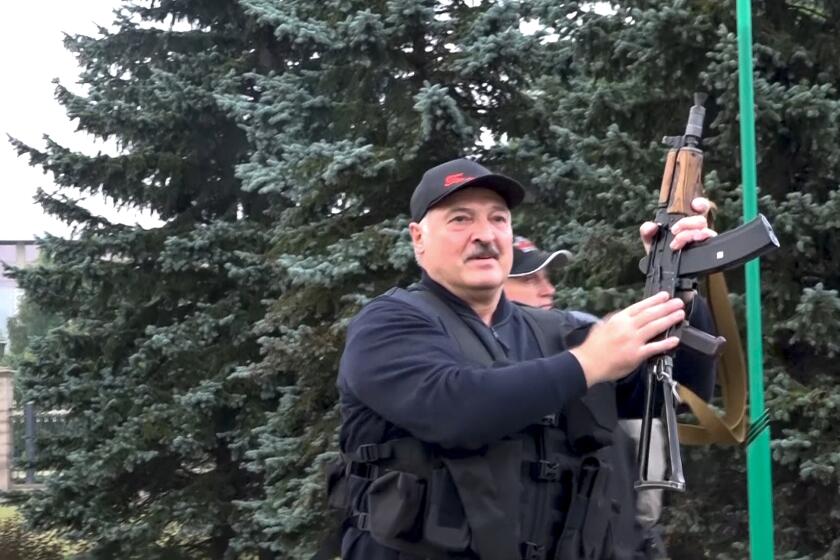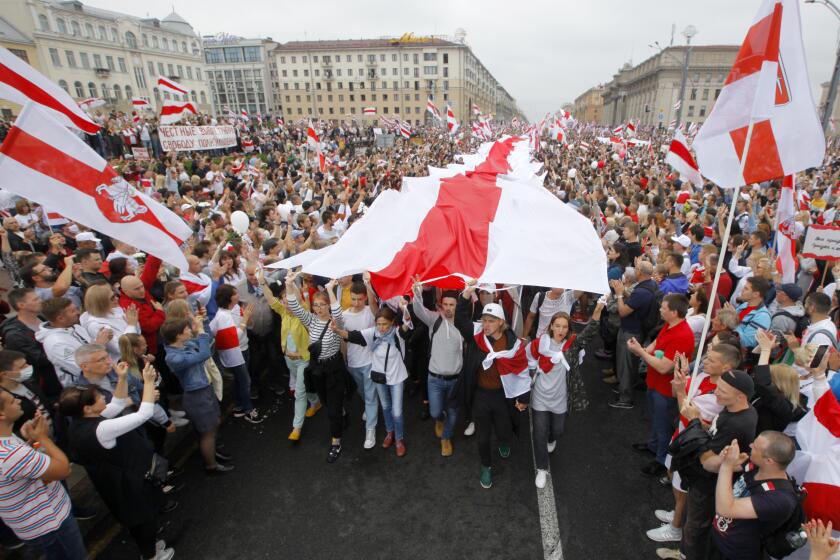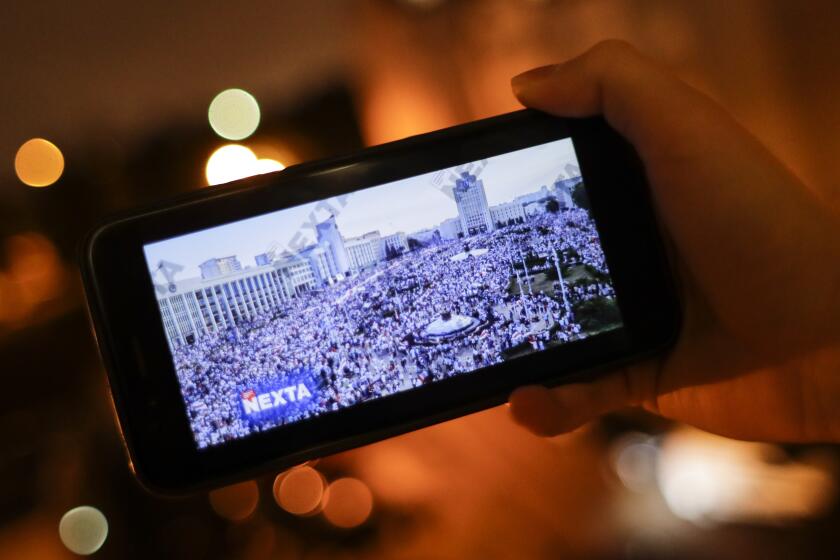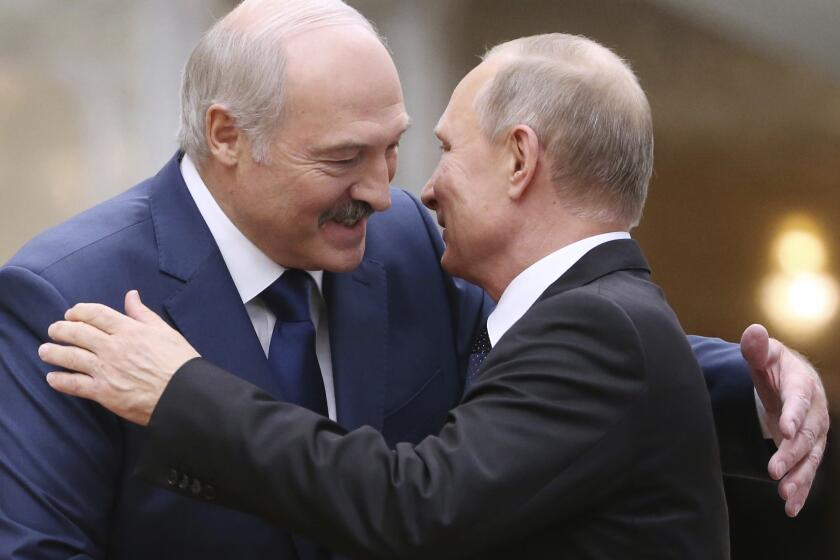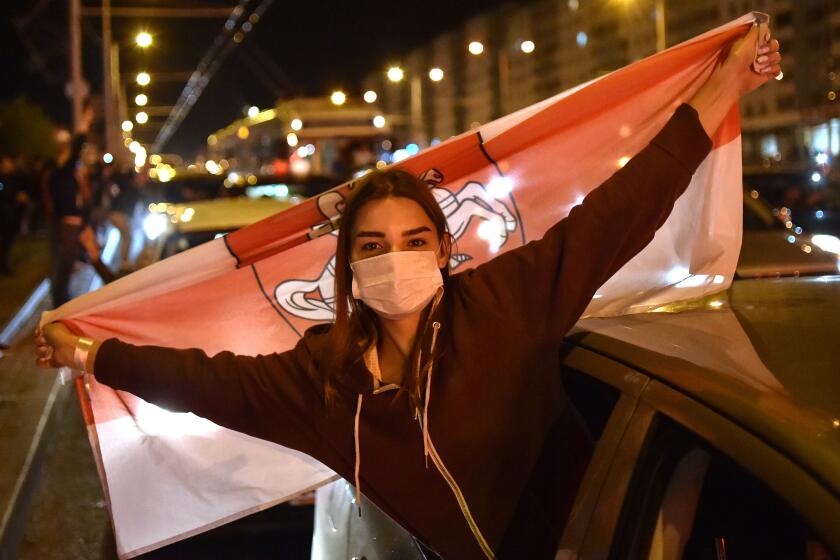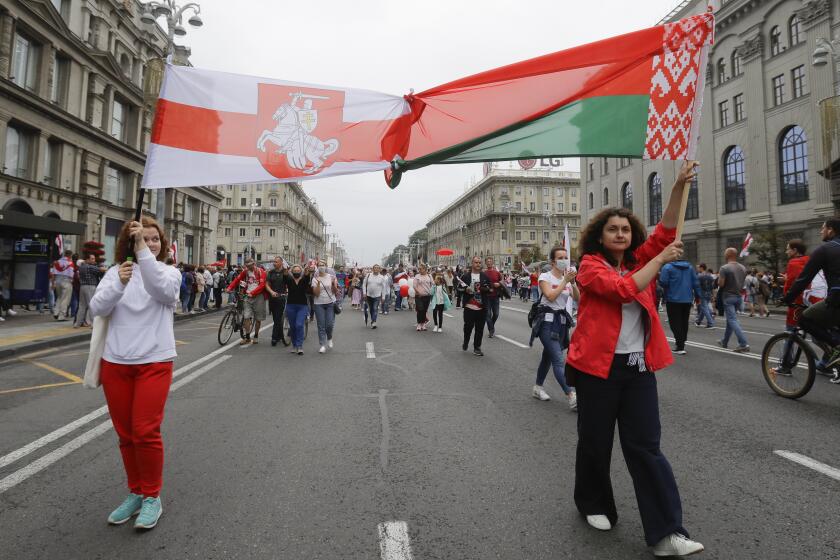Belarus poll workers tell stories of fraud in presidential election
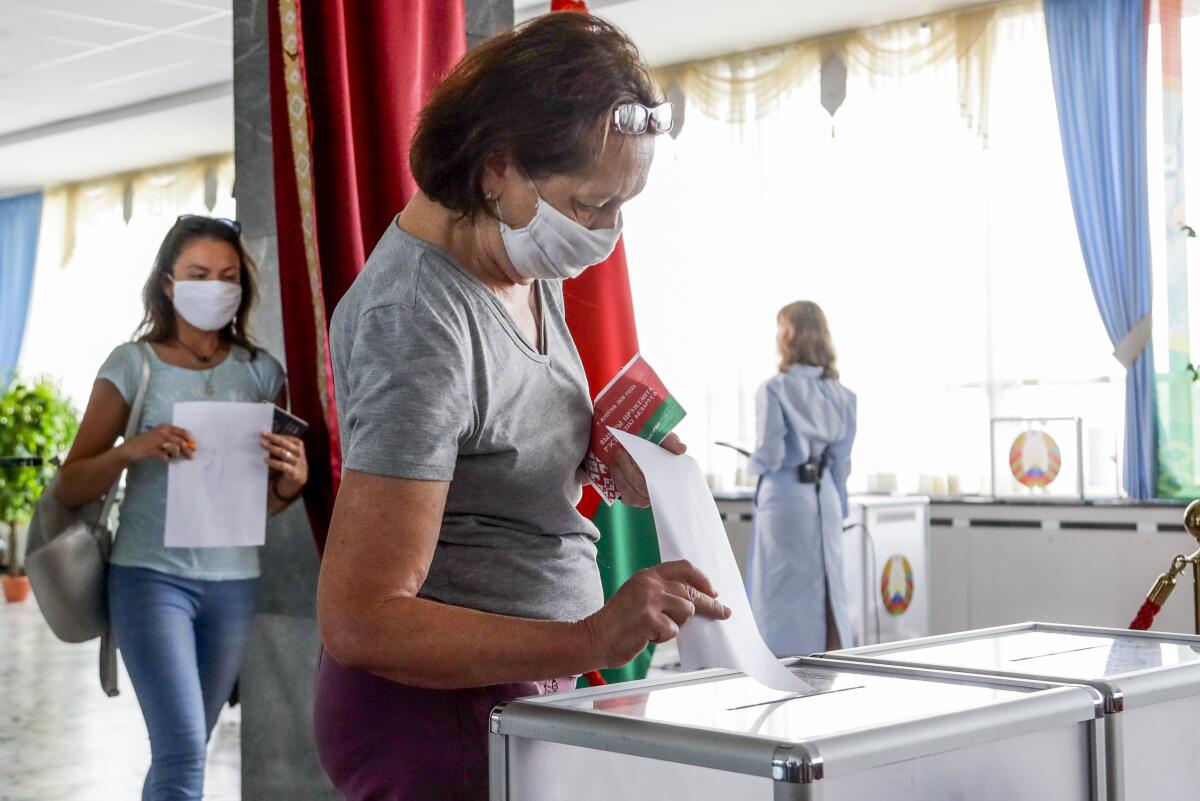
- Share via
MINSK, Belarus — Even before the Aug. 9 presidential election in Belarus ended, a poll worker in Minsk said she was asked to sign a document summing up its result, with the vote totals left blank.
Another worker who pointed out violations during the vote-counting was fired on the spot.
In the small city of Vitebsk, a poll worker said he signed a document with falsified results in favor of President Alexander Lukashenko and later felt racked with guilt for betraying the trust of the voters.
In the three weeks since the election that kept Lukashenko in power with a landslide win, hundreds of thousands of people have protested what they say was a rigged outcome. Demonstrations and strikes in the country have been met by a police crackdown including mass detentions, beatings and criminal charges against organizers.
The Associated Press interviewed election workers who said they saw ballot fraud or were pressured to falsify results in favor of Lukashenko, who has been dubbed “Europe’s last dictator” for his iron-fisted 26-year rule. In addition, other evidence has been posted online showing falsifications and other irregularities in the balloting.
To many in Belarus, his victory last month seemed clearly implausible.
When Belarusians filled the streets to protest what they called a fraudulent election, police used tear gas and beatings in a harsh crackdown.
His main opponent, former English teacher Sviatlana Tsikhanouskaya, drew crowds of tens of thousands of people after she entered the race in place of her husband, Sergei, a popular opposition blogger who was jailed before the election. She managed to unite fractured opposition groups, channeling the growing frustration over the country’s weak economy and Lukashenko’s swaggering dismissal of the coronavirus.
When the results were announced, however, the Central Election Commission said Lukashenko won 4.6 million votes, or 80%, and Tsikhanouskaya received only 588,000, or 10%.
The opposition was prepared for such an outcome: Allegations of rigged elections have surfaced in every vote in Belarus since Lukashenko took power in 1994. This time, though, the opposition trained people to be independent monitors at polling stations, encouraged poll workers to report violations and set up a website where voters could submit photos of their marked ballots to compare with the official count.
Activists monitoring the election said in a report that they received complaints about violations, irregularities and instances of some form of vote-rigging from at least 24% of the country’s 5,767 precincts.
Belarus, shaken by weeks of massive protests, cracks down hard on the news media, deporting some journalists and revoking the accreditation of many.
The report said that they studied just under one-fourth of the nation’s precincts and found that Tsikhanouskaya received over 471,000 votes in those areas alone.
Valeria Artikhovskaya, who worked at a polling station in Minsk, said she still doesn’t know the official results of the vote at her precinct because they were never released.
Artikhovskaya said she was asked to sign the final protocol — a document summing up the vote totals each precinct must display after counting the ballots — before voting even ended, with the totals left blank. Artikhovskaya refused, and once the count started, she noticed other poll workers putting ballots for different candidates into a stack for Lukashenko.
“I said I wouldn’t sign the protocol because it’s a crime — it’s fraud. [I said,] ‘Allow me to recount these ballots,’ and they refused. I didn’t sign the protocol and left the precinct,” the 30-year-old told the AP. “My conscience is dearer to me.”
The Telegram messaging app has become an indispensable tool in coordinating the unprecedented mass demonstrations that have rocked Belarus.
Vadim Korzykov, who worked at another Minsk polling station, said he didn’t even get to the signing stage: A senior poll worker dismissed him after he pointed out violations during the count.
The 20-year-old student said his colleagues told him later that the number of votes for Tsikhanouskaya at the precinct was five times higher than what Lukashenko received there.
“It was a travesty of justice. There is no other name I can call it,” Korzykov said in a phone interview.
Andrei Gnidenko, 29, who worked at a poll in Vitebsk, a small city in northeastern Belarus, said he gave in to the pressure and signed a document with falsified results.
Russian President Vladimir Putin says that his Belarusian counterpart has asked him to provide security assistance after weeks of public protests.
According to the final protocol from the station, a photo of which Gnidenko showed the AP, Tsikhanouskaya got a total of 156 votes, while Lukashenko received 488. But Gnidenko said he and other workers counted over 250 ballots for Tsikhanouskaya.
When the time came to sign the protocol late at night, everyone was exhausted, and a crowd of residents had gathered outside the polling station, demanding to see the results. Gnidenko felt sorry for everyone and decided to get it over with, a decision he now regrets.
“For the next few days, we were all very severely depressed,” he said. “I decided that, since I betrayed the Belarusian people, since I took part in this rigging and put my signature on it, it was my duty to honestly tell it” to the public.
An audio recording from another polling station in Vitebsk was posted on YouTube in which poll workers are heard being told by an official to falsify the results in favor of Lukashenko. The official suggests that poll workers “swap the numbers” for Lukashenko and Tsikhanouskaya.
News Alerts
Get breaking news, investigations, analysis and more signature journalism from the Los Angeles Times in your inbox.
You may occasionally receive promotional content from the Los Angeles Times.
“I’m prepared to agree that a lot of people voted for Tsikhanouskaya … but we have other goals and other problems we need to solve,” the official says in the recording. After some back and forth, poll workers swap the results.
Some of the workers later confirmed to Belarusian media the authenticity of the recording, which has received more than 450,000 hits on YouTube.
Alexander Khomich, a spokesman for the activist group Honest People, which monitored the election, said Tsikhanouskaya received significantly more votes and Lukashenko got significantly fewer votes.
“Given the manner in which the vote has been rigged, I can vouch that no one — not us, not the Central Election Commission — knows the real result of the election,” Khomich said in an interview.
After “Europe’s last dictator” claims election win in Belarus, days of protests put spotlight on women.
The Central Election Commission has refused all requests for a recount, and Lukashenko has bristled at demands to rerun the vote.
In comments to the AP, the commission again rejected accusations of widespread rigging, saying complaints it received from monitors and voters mostly pointed to procedural violations.
“Most complaints are about final protocols not being put out” for public display, said Galina Mkrtychyan, head of the commission’s legal department.
The results were not recognized by the four candidates on the ballot with Lukashenko. Both the U.S. and the European Union have called the election neither free nor fair, and EU foreign ministers are preparing sanctions against senior Belarus officials suspected of election fraud and the subsequent crackdown on protesters.
The Belarus Supreme Court last week refused to overturn the vote, saying it could not rule after election authorities declared it valid.
In the 15th day of the largest and most determined protests in independent Belarus, a crowd of about 200,000 rallied against President Alexander Lukashenko.
Maxim Znak, a lawyer and a member of the opposition Coordination Council, which was set up after the election by the opposition to try to negotiate a transition of power with the Lukashenko government, said the court didn’t even look at 26 folders of evidence from Tsikhanouskaya’s allies.
“They did not investigate this evidence, they didn’t check anything, they didn’t call witnesses. They just said that’s not possible,” he told the AP.
But activists believe the legal battle is far from over. Voters and independent monitors are submitting individual complaints and demanding that law enforcement agencies investigate rigging in their precincts, Znak said.
“For each of those polling stations where people know that they have voted in one way and official results are different, they continue to fight for their votes. They go to the police. They ask to start a criminal investigation,” he added.
Artikhovskaya, the Minsk poll worker, did just that last week, submitting a formal complaint to the prosecutor’s office about the rigging she said she saw.
“We know that people will not forget about this,” Znak said. “People will not forgive what happened.”
More to Read
Sign up for Essential California
The most important California stories and recommendations in your inbox every morning.
You may occasionally receive promotional content from the Los Angeles Times.
